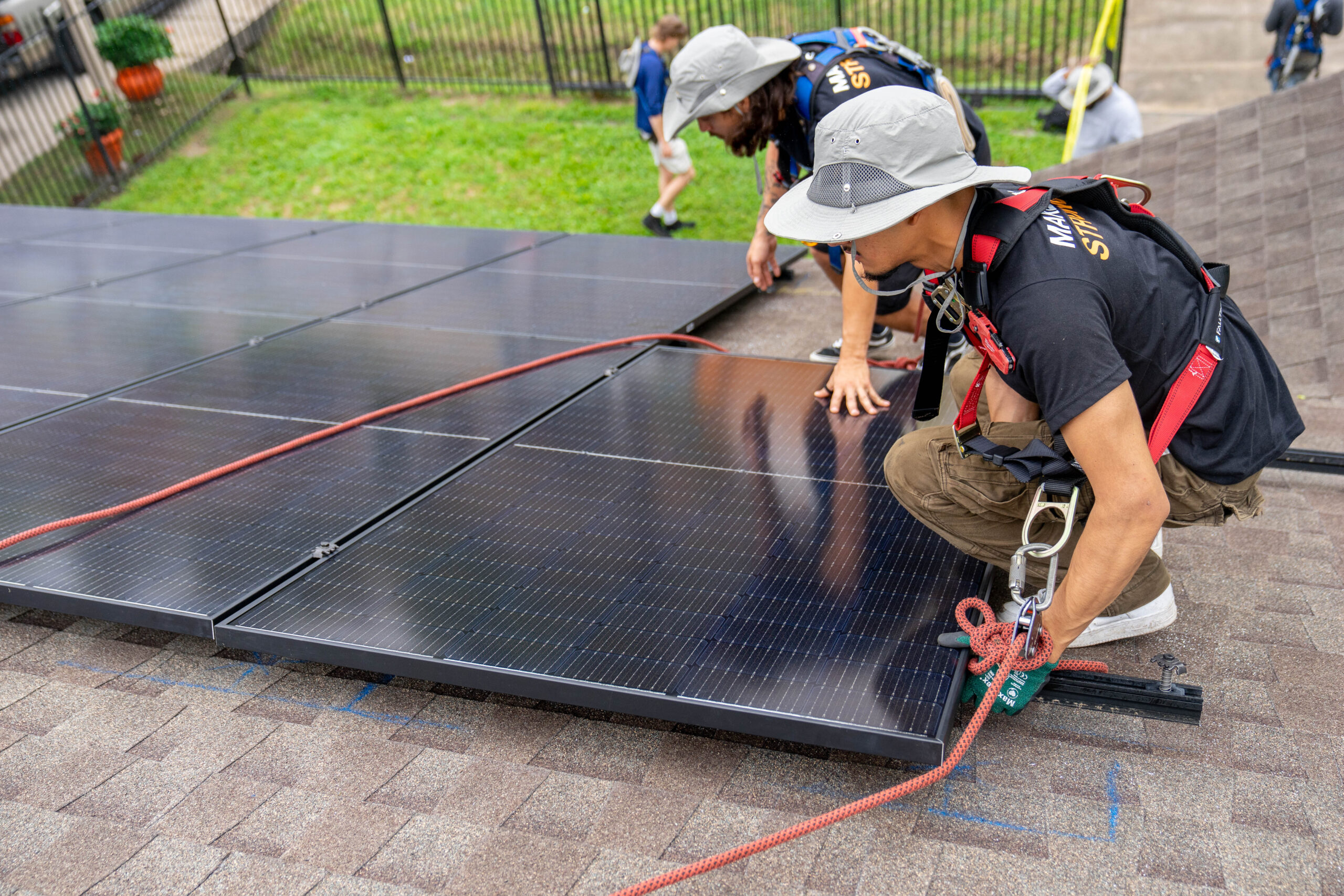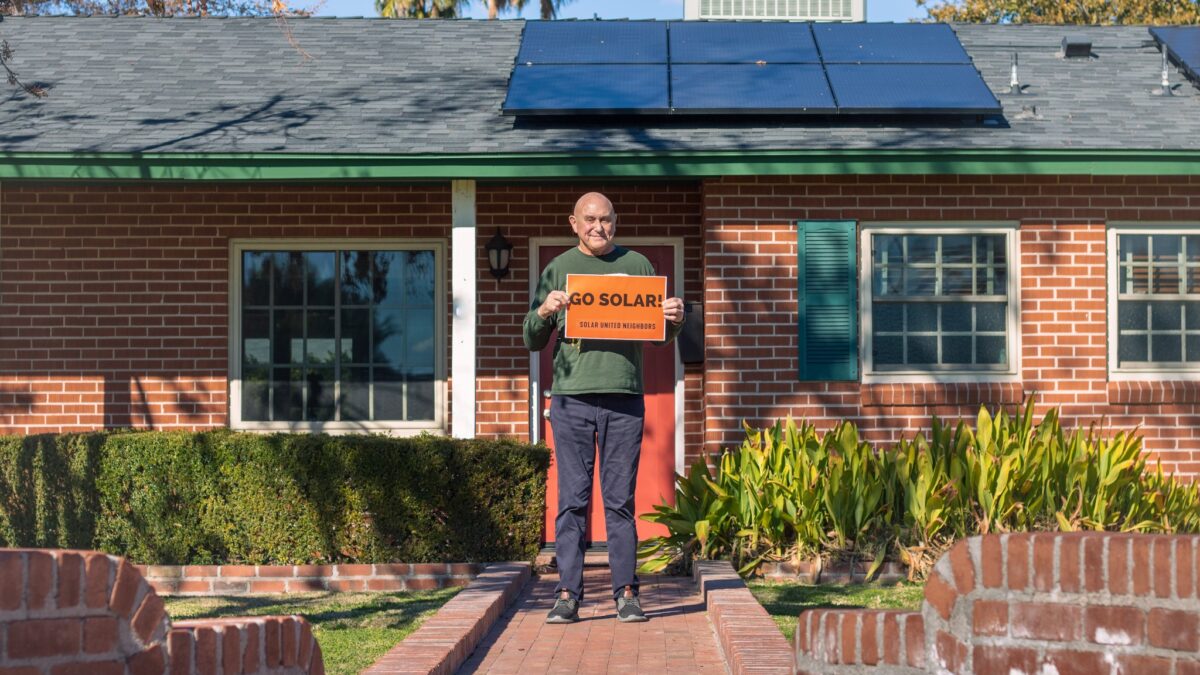How to address problems with your solar installer
- Factsheet

Solar United Neighbors has facilitated thousands of solar installations over the past ten years. Along the way, we’ve seen the best and the worst of the business.
Although it’s rare, some solar installers don’t fulfill their contractual obligations for customers. Should this happen to you, there are several things you can do.
Seven steps to address an installer issueSeven steps to address an installer issue
1. Organize all your paperwork.
Your first step should be to get organized and collect all the paperwork you’ve received from the installer including your proposal, contract, correspondence (including texts), and related paperwork from the local jurisdiction and utility. Document everything! It’s also helpful to make a timeline of what happened when.
2. Connect with your local community of solar supporters.
Joining a community will connect you to solar homeowners and experts who may be familiar with your situation or solar company.
Connect with us! You can book a 15 minute call with a Solar United Neighbors staff member. We have expert knowledge without an agenda (other than to help people like you!). Our team works on the ground in many states and nationally. We can help you navigate your situation.
Reach out to your state’s Solar Energy Industries Association (SEIA) affiliate. In states without a local affiliate, SEIA offers this grievance form. This is a great resource to get advice and publicly call out an installer that’s providing poor service. Connecting with SEIA may motivate the installer to resolve your issue quickly, especially if they are a member of the association. Filing a grievance also enables you to create a paper trail of your experience.
3. Register a complaint with the Better Business Bureau.
It can also be effective to review your installer on public sites like Yelp, Google Reviews, SolarReviews, and others. Be sure to let your installer know that you intend to do this and when you have done so.
4. File a claim with your lender or credit card issuer.
If you have not received the goods and services expected for a financial transaction, your bank or credit card issuers may have a process to assist you in getting a payment canceled or refunded. Check with their consumer protection division. In the case of a credit card transaction, you can dispute the charge.
If your solar installer arranged your financing for you, your lender may have additional obligations and responsibilities to ensure your consumer rights are protected.
5. Make an insurance claim.
Your homeowner’s insurance should cover your solar energy system. You may be able to file a claim with your insurance company related to a contractor and their work. This would be the case if you have monetary or property damage as a result of the work. It would also occur if there’s work that needs to be re-done or completed because it is not compliant with permitting or building code requirements. Your insurer can provide additional information regarding what’s covered. They can explain limits on your policy and answer questions about a potential claim.
6. Contact your local government.
In some cases, you may want to contact state, local, or municipal government agencies for help. These vary by state. Start with your local building, zoning, or permitting office. They can help you determine if the installer’s work meets all requirements. If it does not, they can take follow-up action.
7. Contact your local media.
Media coverage can put pressure on an installer to address your concerns. Local TV and radio stations often have consumer protection reporters that may be interested in covering your experience. If you do contact the media, be sure to have careful documentation of what happened to share. If other customers are affected and willing to be identified, include them in the media outreach to increase your impact.
When to take legal action
If these intermediate steps don’t resolve your issue and you believe have exhausted all other options, legal action may be necessary.
We’ve identified three situations that can warrant legal action.
Note that SUN is providing this information for general educational purposes. It should not be taken as legal advice. Consult your attorney.
1. Failing to perform the contracted work in a timely manner
Your contract with your installer should hold them to a defined completion timeline. Times can vary from two to six months, with longer wait times in busier solar markets.
We recommend that you only sign a contract in which the payments are broken into multiple installments. This will often correspond with a down payment on the date of the contract execution. Larger payments should follow when the equipment is ordered, installed, and interconnected. A payment schedule like this is standard practice.
You should view with caution any installer who asks for the entire payment upfront. Paying your installer in full upfront reduces their incentive to finish your installation on time.
2. Performing work that was not compliant with local building codes or permits
Your contract should include a clause that commits the company to follow local codes and regulation standards. Work that isn’t code-compliant should be identified and resolved during the installation process. This starts when the installer submits an application for a permit. Your local jurisdiction should review their work plan. A second round of approval should occur after your system is installed. This inspection will determine if the installer completed the work as initially approved. Should a problem arise after this, it may be because the work isn’t compliant with local building and electrical codes.
You can check on the status of your permit with the local jurisdiction or see why your inspection did not pass. Be sure to document this.
If you suspect or identify an issue, it is critical that you don’t try to fix it yourself. Doing so may void the workmanship warranty and expose you to bodily harm.
3. Mismanagement of customer payments — or not performing work within agreed-upon timeline or procedure — because of financial insolvency.
Problems with installation timeliness and workmanship quality can lead to legal action. The biggest concern you should have about an installer is one who takes your money and does not perform the work because of financial issues. This is rare, but we’ve seen solar installers accept payments from customers and then go out of business. This leaves their customers on the hook for thousands of dollars with nothing to show for their investment.
Unsuspecting customers may contact the installer wondering why their project doesn’t seem to be moving along, only to find that a number has been disconnected or a website has been taken offline. In this case, legal action is likely your only form of recourse.
What legal action can you take?What legal action can you take?
If you find yourself facing one of these issues, the following options may be your best form of recourse, depending on the state where you live.
Note that SUN is providing this information for general educational purposes. It should not be taken as legal advice. Consult your attorney.
1. File a complaint with the state licensing agency
State and local licensing agencies typically regulate the license requirements for contractors. This includes solar installers. Consult your state or local licensing agency for more information on these requirements. They should provide you with information about filing a complaint against a licensed business. Some states carry emergency or special situation bonds. These could be applied in the case of a contractor not having a license.
2. File a complaint with the state Attorney General office
These state offices are usually set up to receive consumer complaints about businesses operating in the state. Check with your local Attorney General office website to see if they have an online complaint form. They may be able to compel the installer to address your complaint. This depends on their level of authority in these matters. This varies by state and issue. If the office can’t help you directly, they may be able to direct you to the right state or local resource to assist you.
3. File a claim in district court
A district court handles civil issues like complaints against a contractor. You may have a potential claim against your contractor depending on local state law. Legal assistance may be advised or required to pursue this action and any associated remedies. Cost for such assistance will vary by the provider and by the amount of time they spend on your case. Be sure to ask any legal assistance providers about their fees in advance. Request an estimate of how many hours they spend on similar cases.
Need more support?
Let us help. We’ll answer any questions we can or direct you to the right information.
Learn more

Solar rights and consumer protection

Resources for solar owners

How to spot solar panel scams
Get the latest on solar straight to your inbox.
Fight for your solar rights.
Everyone has the right to go solar. Spread the sunshine nationwide and in your local community by taking action, joining events, and more.